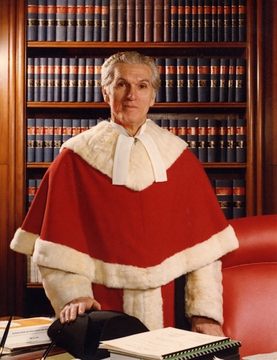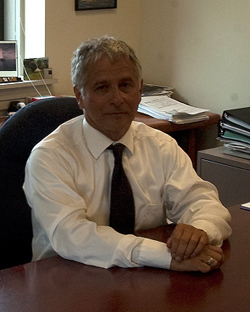Related Research Articles

Osgoode Hall Law School, commonly shortened to Osgoode, is the law school of York University in Toronto, Ontario, Canada. It is home to the Law Commission of Ontario, the Journal of Law and Social Policy, and the Osgoode Hall Law Journal. A variety of LL.M. and Ph.D. degrees in law are available.

Bora Laskin was a Canadian jurist who served as the 14th chief justice of Canada from 1973 to 1984. Laskin was appointed a puisne justice of the Supreme Court in 1970, and served on the Ontario Court of Appeal from 1965 to 1970. Before he was named to the bench, Laskin worked as a lawyer and in academia.

Roland Roy McMurtry was a Canadian lawyer, judge and politician in Ontario. He was a Progressive Conservative member of the Legislative Assembly of Ontario from 1975 to 1985, serving in the cabinet of Bill Davis as Attorney General and as Solicitor General. After leaving politics, McMurtry was High Commissioner of Canada to the United Kingdom between 1985 and 1988. He became a judge in 1991 and was appointed Chief Justice of Ontario in 1996. McMurtry retired from the bench in 2007 and returned to the private practice of law.

Edward Leonard Greenspan, was one of Canada's most famous defence lawyers, and a prolific author of legal volumes. His fame was owed to numerous high-profile clients and to his national exposure on the Canadian Broadcasting Corporation radio series Scales of Justice (1982–94).
Section 7 of the Canadian Charter of Rights and Freedoms is a constitutional provision that protects an individual's autonomy and personal legal rights from actions of the government in Canada. There are three types of protection within the section: the right to life, liberty and security of the person. Denials of these rights are constitutional only if the denials do not breach what is referred to as fundamental justice.
Rocco Galati is an Italian-born Canadian lawyer who specializes in cases involving constitutional law. He is the founder and executive director of the Constitutional Rights Centre.

Halpern v Canada (AG), [2003] O.J. No. 2268 is a June 10, 2003 decision of the Court of Appeal for Ontario in which the Court found that the common law definition of marriage, which defined marriage as between one man and one woman, violated section 15 of the Canadian Charter of Rights and Freedoms.
Patrick J. LeSage is the former Chief Justice of the Ontario Superior Court of Justice.
Brian Slattery, B.A., BCL, D.Phil., F.R.S.C., is a Professor Emeritus of Law at Osgoode Hall Law School, York University, in Toronto, Ontario, Canada. He is a prominent academic in Canadian Constitutional Law and Aboriginal rights discourse. He practices Aboriginal law at Slattery & Slattery.
Robert James Sharpe, OC, FRSC is a Canadian lawyer, author, academic, and judge. He was dean of the University of Toronto Faculty of Law from 1990 to 1995 and a judge of the Court of Appeal for Ontario from 1999 to 2020.

R v Grant, 2009 SCC 32 is a leading decision of the Supreme Court of Canada on section 9, section 10 and section 24(2) of the Canadian Charter of Rights and Freedoms ("Charter"). The Court created a number of factors to consider when determining whether a person had been detained for the purpose of sections 9 and 10 of the Charter. The Court also created a new test for determining whether evidence obtained by a Charter breach should be excluded under section 24(2) of the Charter, replacing the Collins test.
The passage of the Canadian Charter of Rights and Freedoms in 1982 allowed for the provision of challenging the constitutionality of laws governing prostitution law in Canada in addition to interpretative case law. Other legal proceedings have dealt with ultra vires issues. In 2013, three provisions of the current law were overturned by the Supreme Court of Canada, with a twelve-month stay of effect. In June 2014, the Government introduced amending legislation in response.

Joseph James Arvay, was a Canadian lawyer who argued numerous landmark cases involving civil liberties and constitutional rights.
Michael Moldaver is a former Canadian judge. He was a puisne justice on the Supreme Court of Canada from his 2011 appointment by former Prime Minister Stephen Harper until his retirement in 2022. Before his elevation to the nation's top court, he served as a judge at the Ontario Superior Court of Justice and the Court of Appeal for Ontario for over 20 years. A former criminal lawyer, Moldaver is considered an expert in both Canadian criminal law and the Canadian Charter of Rights and Freedoms.
Re Drummond Wren [1945] O.R. 778 is a decision by the Ontario High Court, presided by Justice Mackay, regarding the validity of a racially motivated restrictive covenant. The Workers' Educational Association purchased the lot in East York. The covenant prohibited the land to be sold to "Jews, or persons of objectionable nationality". Drummond Wren brought forward an action to have the restrictive covenant declared invalid. Wren was the general secretary of the Workers' Educational Association. He was represented by John Cartwright and Irving Himel. J. M. Bennett appeared as legal counsel for the Canadian Jewish Congress, assisted by Bora Laskin, Jacob Finkelman, and Charles Dubin.

Guindon v Canada, 2015 SCC 41 is a landmark decision of the Supreme Court of Canada on the distinction between criminal and regulatory penalties, for the purposes of s.11 of the Canadian Charter of Rights and Freedoms. It also provides guidance on when the Court will consider constitutional issues when such had not been argued in the lower courts.

Mark M. Persaud, LL.B., LL.M., LL.D. is a Canadian lawyer, entrepreneur, civic leader, and public figure. He is a former federal prosecutor.
Paul B. Schabas is a judge of the Ontario Superior Court of Justice.
M. David Lepofsky is a Canadian academic, retired lawyer, disability advocate. Blind for much of his life, Lepofsky was named one of Canada's most influential lawyers in 2010.
After a sexual assault or rape, victims are often subjected to scrutiny and, in some cases, mistreatment. Victims undergo medical examinations and are interviewed by police. If there is a criminal trial, victims suffer a loss of privacy, and their credibility may be challenged. Victims may also become the target of slut-shaming, abuse, social stigmatization, sexual slurs and cyberbullying. These factors, contributing to a rape culture, are among some of the reasons that may contribute up to 80% of all rapes going unreported in the U.S, according to a 2016 study done by the U.S. Department of Justice.
References
- ↑ "Osgoode Hall".
- ↑ R v Emery, [1992] OJ No 640 (OCJ Gen. Div.)
- ↑ R v Andriopoulous, [1994] OJ No 2314 (CA)
- ↑ Iorfida v MacIntyre, [1994] OJ No 2293 (OCJ Gen. Div.)
- ↑ See, for example, R v Spindloe, [2001] SJ No 266 (SKCA)
- ↑ R v Malmo-Levine; R v Clay, [2002] SCJ No 88 (SCC)
- ↑ "imdb". IMDb .
- ↑ Interview with Young, April 18, 2018.
- ↑ Wakeford v Canada, [2001] OJ No 4921 (CA), affirming the decision in [2001] OJ No 390 (SCJ); Hitzig et al v Canada, [2003] OJ No 3873 (CA); and Sfetkopoulous v Canada, [2008] FCJ No 1472 (FCA)
- ↑ Hitzig v Canada (2003) 177 CCC 3(d) 449 (OCA); Sfetkopoulos v Canada (2008) FCA 328
- ↑ Canada (Attorney General) v Bedford, [2013] 3 SCR 1101 (SCC)
- ↑ Kady O'Malley, "'Confused' prostitution bill can't be fixed, lawyer Alan Young says," CBC News (17 September 2014), online: <www.cbc.ca/news>.
- ↑ Interview with Young, 18 April 2018. In the late 1990s, Young championed the rights of medical marijuana advocate, Terry Parker, to picket outside of Sick Kids Hospital to express concerns about non-consensual psychosurgery. In the early 2000s, he championed the rights of journalist, Stephen Williams author of Invisible Darkness, to protect his sources of information.
- ↑ Attorney General (Ontario) v Langer, [1995] OJ No 1045 (OCJ Gen. Div.)
- ↑ Interview with Young, supra Note 15.
- ↑ Alan Young, Justice Defiled: Perverts, Potheads, Serial Killers and Lawyers (Toronto: Key Porter Books, 2013).
- ↑ [1992] OJ No 2394 (CA)
- ↑ See, for example, Chaudhary v Ontario (Attorney General), [2013] OJ No 4616 (CA)
- ↑ Albon v Ontario (Attorney General), 2019 ONSC 3372
- ↑ Richards v Springhill Institution, [2015] NSJ No 178 (NSCA)
- ↑ See, for example, Green v Toronto (City) Police Service, [2016] OJ No 5877 (SCJ)
- ↑ See, for example, Brett Popplewell, "Police complaint system still flawed: critics," Toronto Star (3 August 2008), online: <www.thestar.com>.
- ↑ Oniel v Toronto (Metropolitan) Police Force, [2001] OJ No 90 (CA); McTaggart v Ontario, [2000] OJ No 4766 (SCJ).
- ↑ Alan Young, "The Role of the Victim in the Criminal Process: A Literature Review – 1989 to 1999" (Ottawa: Department of Justice – Research and Statistics Division, 2001); Alan Young, "Criminal Compensation in Canada: A Status Report" (Ottawa: Department of Justice, 2001); Alan Young, "Crime Victims and Constitutional Rights" (Ottawa: Department of Justice, 2003).
- ↑ Vanscoy v Ontario, [1999] OJ No 1661 (SCJ)
- ↑ "The Ken and Barbie Killers". IMDb .
- ↑ "Paula Todd Network". YouTube .
- ↑ "CBC News". YouTube .
- ↑ Alan Young, The Innocence Project (Toronto: Ideacity, June 2014), online: <https://www.youtube.com/watch?v=Dn89NhACYEA>; Alan Young, Defending Pot (Toronto: Ideacity, June 2006), online: <https://www.youtube.com/watch?v=W1murtA_bww>.
- ↑ "A Legal Disruptor".
- ↑ "Global News".
- ↑ Alan Young, Justice Defiled: Perverts, Potheads, Serial Killers and Lawyers (Toronto: Key Porter Books, 2013).
- ↑ (1988) 53 Sask L.R. 47-112
- ↑ (2000) Law Society or Upper Canada Special Lectures
- ↑ (2008) 40 S.C.L.R. (D2)
- ↑ (2012) Unsettled Legacy: Thirty Years of Criminal Justice Under the Charter (2012) eds Benjamin Berger and James Stribopoulos. Canada LexisNexis Canada
- ↑ Special Lectures, 2017: Canada 150 - The Charter and the Constitution, The Law Society of Canada. Toronto: The Law Society of Upper Canada
- ↑ (1987) 25 Osgoode Hall Law Journal 305-374
- ↑ (1988) 4 Intellectual Property Journal 25-62
- ↑ (1990) 2 Media and Communications Law Journal 155
- ↑ (1991) 29 Osgoode Hall Law Journal 329
- ↑ The Impact of the Canadian Charter of Rights and Freedoms in the Criminal Law, ed. Jamie Cameron (Carswell 1995)
- ↑ Ottawa: Department of Justice - Research and Statistics Division, 2001
- ↑ (2005) 49 Criminal Law Quarterly 1
- ↑ Department of Justice Canada, 2001 CanLIIDocs 13572 "CanLIIDocs".